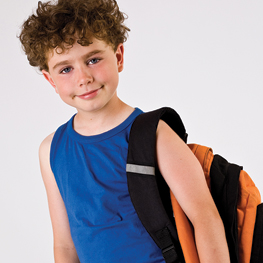
My daughter recently went on an exchange trip with her teachers and classmates. She was out of the country for 10 days without her dad, her siblings or me. She did great. In fact, she was so excited that her bag was packed a full week before her trip. As she calmly hugged and kissed us good bye, I took time to reflect on how she arrived in that place of calm confidence.
How do parents prepare and toughen up their kids for extended time away from them? What steps can parents follow to ready themselves for the long separation?
1. Start small and build from there. Encourage your child to explore and challenge themselves. Think of when your child learned to ride a bike; you didn’t have them start on a hill. You had them start on a flat surface and, if you were like me, it was grass and training wheels. I never would have considered sending my daughter out of the country when she was eight or nine, but I did send her away to overnight camps so that she could get used to being apart. She was away longer each consecutive year; her confidence and independence grew. In turn, I learned to let go a little more each time.
2. Admit and face your fears. Your child absorbs your fears, just like they absorb your values and sense of humor. What are you afraid of? Yes, things can happen; however, remember that far more good things happen than bad. Fear can paralyze someone from trying. Growth comes from challenges. How will they test themselves and gain confidence in their abilities if they are fearful or not able to overcome real or perceived obstacles? Try to model confidence and a positive outlook when you face challenges. Your child will likely do the same.
3. Teach your child safety and to look out for others. Safety is a key issue with all parents. We begin teaching safety as soon as our children join us. I didn’t put my child on a plane and say, “See you later.” I prepared her through the years on matters like staying with her group, always having a buddy, no talking to strangers, being aware of her surroundings, washing her hands, looking both ways before she crossed the street - you get the idea. We talked about other situations that might come up. Kids would be together in close contact for a long period of time and become edgy. There might be issues with privacy or a friend who was homesick.
4. Prepare your child to adapt to new surroundings and to the unexpected. Talk to your child about what to expect. A well-prepared child has knowledge and options to adapt if necessary. For example, my daughter was traveling where sanitation could be a problem and because of that, food safety was a concern. Caution about what she ate and drank was paramount; eating and drinking like the locals would most likely make her sick. She would have to make the decisions about what she ate and drank.
We researched the common types of food offered and how they were prepared. Fresh and unpeeled vegetables were not going to be an option unless she was assured that they were washed with purified water. We role-played - important reinforcement for my salad-loving girl - since I wouldn’t be there to remind her. We also visited and ate at restaurants that had similar foods on their menu; this exposed her palate and helped her discover what she might enjoy when in that country.
5. Try something new. Doing something for the first time can be scary. It can also be fun, exciting and empowering. Show your child how to venture out and explore new by modeling, like trying a new food. Watching you try, explore and discover instills courage in your child to do the same. Kids feel a sense of accomplishment when they have tried something new, whether they like it or not. They grow from the exposure and experience.
My daughter is proud that she traveled and experienced a different culture without her family. She’s ready to travel to a new destination again.
Judy is a freelance writer living with her husband and four children.
Calgary’s Child Magazine © 2024 Calgary’s Child